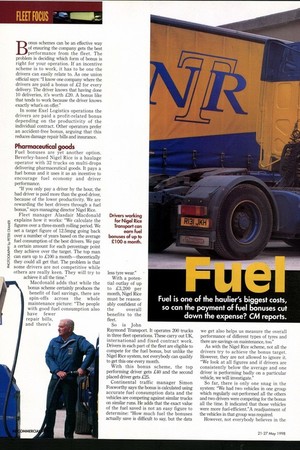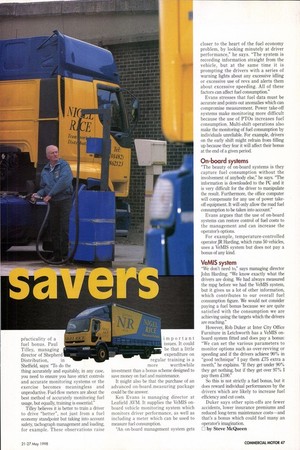Fuel is one of the haulier's biggest costs, so can
Page 46

Page 47

If you've noticed an error in this article please click here to report it so we can fix it.
the payment of fuel bonuses cut down the expense? CM reports. Bonus schemes can be an effective way of ensuring the company gets the best performance from the fleet. The problem is deciding which form of bonus is right for your operation. If an incentive scheme is to work, it has to be one the drivers can easily relate to. As one union official says: "I know one company where the drivers are paid a bonus of £2 for every delivery. The driver knows that having done 10 deliveries, it's worth £20. A bonus like that tends to work because the driver knows exactly what's on offer."
In some Exel Logistics operations the drivers are paid a profit-related bonus depending on the productivity of the individual contract. Other operators prefer an accident-free bonus, arguing that this reduces damage repair bills and insurance.
Pharmaceutical goods Fuel bonuses are yet another option. Beverley-based Nigel Rice is a haulage operator with 32 trucks on multi-drops delivering pharmaceutical goods. It pays a fuel bonus and it uses it as an incentive to encourage fuel economy and driver performance.
"If you only pay a driver by the hour, the bad driver is paid more than the good driver, because of the lower productivity. We are rewarding the best drivers through a fuel bonus," says managing director Nigel Rice.
Fleet manager Alasdair Macdonald explains how it works: "We calculate the figures over a three-month rolling period. We set a target figure of 12.5mpg going back over a number of years based on the average fuel consumption of the best drivers. We pay a certain amount for each percentage point they achieve over the target. The top man can earn up to 1100 a month—theoretically they could all get that. The problem is that some drivers are not competitive while others are really keen. They will try to achieve it all the time."
Macdonald adds that while the bonus scheme certainly produces the benefit of fuel savings, there are spin-offs across the whole maintenance picture: "The people with good fuel consumption also have fewer repair bills, and there's less tyre wear."
With a potential outlay of up to £3,200 per month, Nigel Rice must be reasonably confident of the overall benefits to the fleet.
So is John Raymond Transport. It operates 200 trucks in three fleet operations. These carry out UK, international and fixed contract work. Drivers in each part of the fleet are eligible to compete for the fuel bonus, but unlike the Nigel Rice system, not everybody can qualify to get this one every month.
With this bonus scheme, the top performing driver gets £40 and the second placed driver gets £25.
Continental traffic manager Simon Foxworthy says the bonus is calculated using accurate fuel consumption data and the vehicles are competing against similar trucks on similar runs. He adds that the exact value of the fuel saved is not an easy figure to determine: "How much fuel the bonuses actually save is difficult to say, but the data we get also helps us measure the overall performance of different types of tyres and there are savings on maintenance, too."
As with the Nigel Rice scheme, not all the drivers try to achieve the bonus target. However, they are not allowed to ignore it. "We look at all figures and if drivers are consistently below the average and one driver is performing badly on a particular vehicle, we will investigate."
So far, there is only one snag in the system: "We had two vehicles in one group which regularly out-performed all the others and two drivers were competing for the bonus all the time. It indicated that those vehicles were more fuel-efficient."A readjustment of the vehicles in that group was required.
However, not everybody believes in the practicality of a fuel bonus. Paul Tilley, managing director of Shepherd Distribution, in Sheffield, says: "To do the thing accurately and equitably, in any case, you need to ensure you have strict controls and accurate monitoring systems or the exercise becomes meaningless and unproductive. Fuel-flow meters are about the best method of accurately monitoring fuel usage, but equally, training is essential."
Tilley believes it is better to train a driver to drive "better", not just from a fuel economy standpoint but taking into account safety, tachograph management and loading, for example. These observations raise important issues. It could be that a little expenditure on regular training is a more worthwhile investment than a bonus scheme designed to save money on fuel and maintenance.
It might also be that the purchase of an advanced on-board,measuring package could be the answer.
Ken Evans is managing director at Leafield AVM. It supplies the VeMIS onboard vehicle monitoring system which monitors driver performance, as well as including a meter which can be used to measure fuel consumption.
"An on-board management system gets closer to the heart of the fuel economy problem, by looking minutely at driver performance," he says. "The system is recording information straight from the vehicle, but at the same time it is prompting the drivers with a series of warning lights about any excessive idling or excessive use of revs and alerts them about excessive speeding. All of these factors can affect fuel consumption."
Evans stresses that fuel data must be accurate and points out anomalies which can compromise measurement. Power take-off systems make monitoring more difficult because the use of PTOs increases fuel consumption. Multi-shift operations also make the monitoring of fuel consumption by individuals unreliable. For example, drivers on the early shift might refrain from filling up because they fear it will affect their bonus at the end of a given period.
On-board systems "The beauty of on-board systems is they capture fuel consumption without the involvement of anybody else," he says. "The information is downloaded to the PC and it is very difficult for the driver to manipulate the result. Furthermore, the office computer will compensate for any use of power takeoff equipment It will only allow the road fuel consumption to be taken into account."
Evans argues that the use of on-board systems can restore control of fuel costs to the management and can increase the operator's options.
For example, temperature-controlled operator JR Harding, which runs 50 vehicles, uses a VeMIS system but does not pay a bonus of any kind.
VeMIS system "We don't need to," says managing director John Harding. "We know exactly what the drivers are doing. We had always measured the mpg before we had the VeMIS system, but it gives us a lot of other information, which contributes to our overall fuel consumption figure. We would not consider paying a fuel bonus because we are quite satisfied with the consumption we are achieving using the targets which the drivers are reaching."
However, Rob Duker at Inter City Office Furniture in Letchworth has a VeMIS onboard system fitted and does pay a bonus: "We can set the various parameters to monitor options such as over-revving or speeding and if the drivers achieve 90% in "good technique" I pay them £75 extra a month," he explains. "If they get under 90% they get nothing, but if they get over 97% I pay them L100."
So this is not strictly a fuel bonus, but it does reward individual performances by the drivers which are likely to increase fuel efficiency and cut costs.
Duker says other spin-offs are fewer accidents, lower insurance premiums and reduced long-term maintenance costs—and that's a bonus which could fuel many an operator's imagination.
by Steve McQueen






















































































































